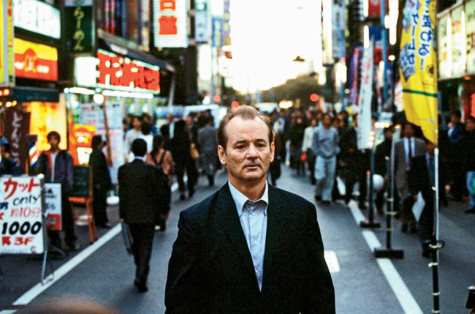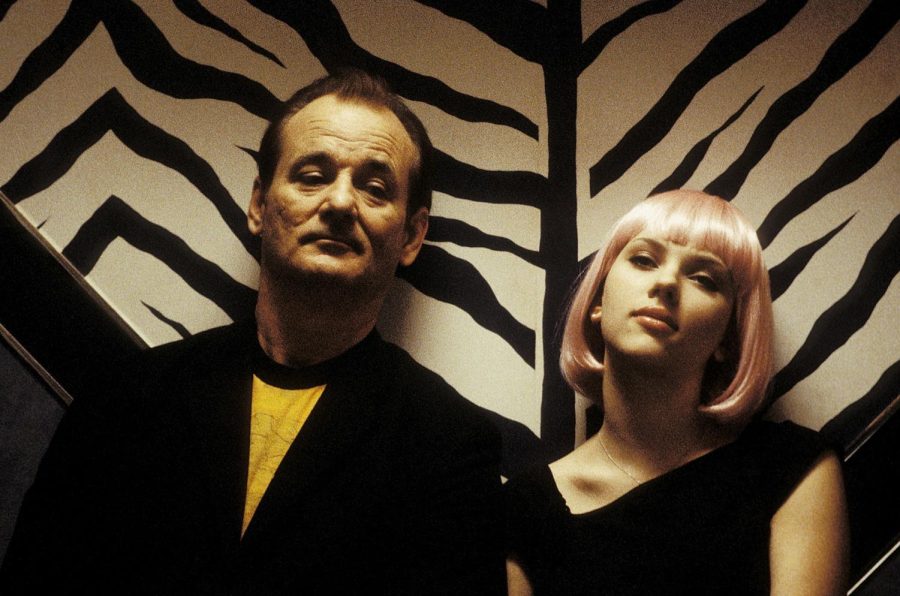Isolationism in Film: Lost In Translation
March 2, 2023
Isolationism in Film: Lost In Translation
Lost In Translation was released in 2003 by Sofia Coppola, daughter of renowned director Francis Ford Coppola, who directed Apocalypse Now and The Godfather. To say Sofia did not live up to the legacy of her father would be understandable (because almost no one could), but it would be unfair not to mention the fact that she created a masterpiece that Francis would never be able to create. Lost In Translation stars an extrinsically motivated yet intrinsically empty Bob Harris (who is played by a middle-aged Bill Murray) who has traveled to Japan to make a series of appearances, ranging from a whisky commercial to being a talk-show co-star. He meets a similarly empty and hopeless Charlotte (played by a 17-year-old Scarlett Johansen) and the two grow a bond that almost pushes the boundaries of platonic love (which in hindsight, can be questionable measuring their age gap, but this was one of the sole intentions of the movie).
The aroma of the movie is that of a delicately crafted bread that has almost gone stale yet has a shimmer of hope if it were to be put on the pan and reheated. There is a lingering dread that follows both Bob and Charlotte, as they are facing failing marriages in which they find no joy, which can also be said about their business ventures in Japan. That is until they find one another, which leads to one of the greatest on-screen displays of (mostly) platonic love in a movie. Such a description of the plot would do this movie no justice though, so before the short discourse on isolation is followed through upon, it is important to clarify that by no means is this a perfect movie. Some suggest that the Japanese natives are merely a backdrop for the white, pity-seeking main characters (who mock their broken English while they can only understand one language) and make sure to note how suggestive the age gap between the two characters may be. The latter certainly leaves something to be desired in terms of being closer in age, but the former critique, in my sole opinion, adds to the experience of the movie (not to say it is right by any means, but it is a storytelling device utilized within the movie which holds more significance than many may realize).
The constant, recurring theme is found throughout the movie in isolation. There are multitudes of barriers that both Bob and Charlotte are stuck behind and can only find comfort within themselves, which itself is blocked by several barriers. There is almost no time when the characters are truly free (until the end of the movie, which can also be debated due to its ambiguity). Bob, the washed-up movie star, is seen struggling to adjust to the culture in Japan, starting as early as his first scene in the movie. This is only emphasized when he attempts to do a ‘‘Suntory’’ whiskey advertisement, in which the Japanese director goes on rants, giving Bob mountains of advice and his vision for how Bob should go into the scene, yet Bob’s translator gives him the bare minimum of the gist of what the director wants, simply telling him where to tilt his head and to speak with more ‘‘intensity’’. Bob does not know how to respond to the cultural shock of Japanese culture in terms of how it is to be polite and struggle with appropriate social cues during situations that call for them, as is mocked. He only responds with such (even when he is not being targeted or made fun of), as throughout the movie he makes fun of the broken English spoken by the Japanese natives. This creates a flawed character within Bob, as the outlet of a ‘‘washed-up’’ movie star is emphasized through his diminishing relevance and increasingly solitary situation, in which he copes by making himself seem like the Japanese natives in this situation, which is only morally ambiguous enough to fit such an archetype.
When Bob meets Charlotte, he slightly brightens up from the demeanor he has been seen in throughout the entire movie so far. He finds familiarity through another American alcoholic who ends up sitting next to him at the bar, which he accepts kindly. Their entire relationship is built upon the fact that they are outcasts to everyone around them with failing hopes and marriages and have egos too high for anyone but one another to put up with. Yet, those nights that they go out because they aren’t able to go to bed are symbolic of their nature of not being able to fit into places most people would, leading to their divergent attitudes to face the alienating environment of Tokyo. They can’t even fully embrace one another’s presence due to their marriages and age gaps, which allows for an impermeable barrier that the characters seem to only momentarily cross (which is the most morally apprehensible aspect of this film). Bob’s mentality that he needs to change his life is only supported by Charlotte’s remarks that he is going through a mid-life crisis, which encourages Bob to act out in ways he hasn’t in a while, invigorating him to a point where he momentarily feels something.
Bill Murray’s performance in this movie is reminiscent of the character of Bojack Horseman (which is ironic considering how inspired one of the episodes for the show was by this movie). The washed-up movie star looking for ventures to fill the ever-increasing hole of self-loathing and pity, which is only momentarily plugged by the hope of finding someone who can introduce you to new experiences or allow you to pursue dreams you did not know existed in the back of your head, only to be flushed by reality’s sharp corkscrew, drilling into that plug to let the flood of reality sink down the hole of seemingly infinite emptiness.
The feeling of emptiness is only supported by the movie’s fantastic soundtrack. The droning guitars of ‘‘Sometimes’’ by My Bloody Valentine alongside the grating and echoic ambiance of ‘‘Just Like Honey’’ by the Jesus and Mary Chain add to the disparate tone of the movie which doesn’t allow the viewer complete comfort, yet they are not on the edge of their seats waiting for what’s going to happen next. It’s an awkward mix of tones that is, simply indescribable, which is perfect for what the director was going for. From the dreary colors to the absence of subtitles when there is Japanese spoken (and there is a lot spoken), the movie isn’t there to serve as a comfort, but it isn’t meant to push the boundaries drastically in terms of a new experience. It’s like Bob says in the movie: ‘‘It’s not fun, it’s different’’. And sometimes, different is good.



